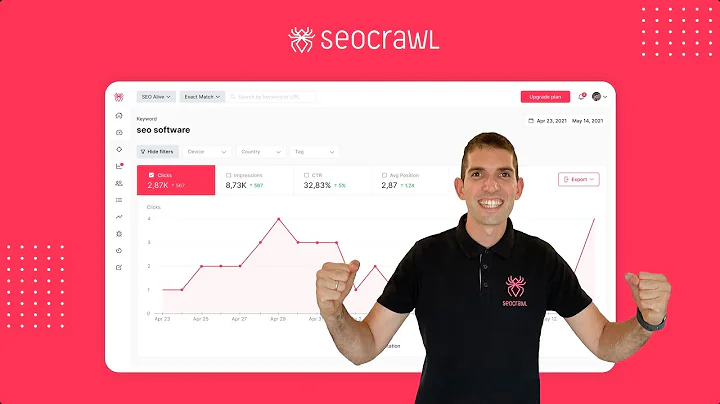Beginner's Guide to SEO: Step-by-Step Process for Improved Website Visibility
Table of Contents:
- Introduction
- Step 1: Define Your Why
- Step 2: Conduct Keyword Research
- Step 3: Use SEO Tools for Insights
- Step 4: Group Keywords into Clusters
- Step 5: Create High-Quality Content
- Step 6: Focus on On-Page SEO
- Step 7: Promote and Distribute Your Content
- Conclusion
Introduction
Are you new to SEO and looking for a beginner's guide to get started? In this article, we will provide you with a step-by-step process to help you understand and implement SEO strategies. By following these simple steps, you will be able to improve the visibility and ranking of your website on search engine result pages. Whether you are a business owner or an individual looking to enhance your online presence, this guide is designed to meet your SEO needs.
Step 1: Define Your Why
Before diving into the technical aspects of SEO, it's essential to understand why you want to focus on search engine optimization. Determine the purpose behind your interest in SEO, such as generating more leads for your business or increasing your online visibility. Having a clear understanding of your objectives will help you stay motivated throughout the SEO journey.
Step 2: Conduct Keyword Research
Keyword research is crucial in SEO as it allows you to identify the phrases that people are searching for in your industry. Start by using Google to explore related phrases and jot them down. Rank these phrases based on your intuition and what you believe people would search for the most. This will give you a starting point for your SEO strategy.
Step 3: Use SEO Tools for Insights
To validate your keyword research and gain further insights, leverage SEO tools such as Keywords Everywhere. These tools provide information on search volume and competition for your chosen keywords. Look for phrases with high search volume and low competition to increase your chances of ranking well in search results.
Step 4: Group Keywords into Clusters
Organize your keywords into clusters or categories to make it easier to create content around specific topics. Identify common themes or topics within your keyword list and group them together. This clustering approach helps you develop a content strategy that covers various aspects of your industry and addresses the search intent of your target audience.
Step 5: Create High-Quality Content
Content creation is a critical aspect of SEO. Focus on producing high-quality, comprehensive content that fulfills the search intent of your target audience. Use headers (H2-H6) to structure your content and make it easily scannable. Ensure that your content adequately covers the topic and provides valuable information to the readers.
Step 6: Focus on On-Page SEO
In addition to creating high-quality content, pay attention to on-page SEO elements. Optimize your meta tags, use descriptive URLs, and include relevant keywords throughout your content. Make sure your website is mobile-friendly and has a fast loading speed. These on-page optimization techniques contribute to better visibility and user experience.
Step 7: Promote and Distribute Your Content
Once you have created high-quality content, it's crucial to promote and distribute it effectively. Reach out to influencers or websites in your industry and ask for feedback or backlinks. Actively share your content on social media platforms and engage with your audience. By promoting your content, you increase its chances of reaching a wider audience and gaining more visibility.
Conclusion
SEO can seem daunting for beginners, but by following these step-by-step instructions, anyone can start implementing effective SEO strategies. Remember to define your goals, conduct keyword research, utilize SEO tools, create quality content, optimize on-page elements, and promote your work. With persistence and dedication, you can improve your website's ranking and attract more organic traffic.
📌 Highlights:
- Understand the importance of defining your goals in SEO.
- Conduct keyword research to identify valuable phrases.
- Validate your keyword choices using SEO tools.
- Group keywords into clusters for targeted content creation.
- Create high-quality and comprehensive content.
- Optimize on-page elements for better visibility.
- Promote and distribute your content to reach a larger audience.
🔍 Resources:
FAQ
Q: Can I perform SEO without any prior experience or technical knowledge?
A: Yes, SEO can be learned and implemented by anyone, regardless of their technical background. The key is to follow a systematic approach and continue learning and adapting as you go.
Q: Is it necessary to invest in paid SEO tools?
A: While paid SEO tools can provide additional insights and features, there are also free alternatives available that can help you get started with basic SEO research. It's important to choose tools based on your specific needs and budget.
Q: How long does it take to see results from SEO efforts?
A: SEO is a long-term strategy, and it can take time to see significant results. The timeline for seeing improvements in rankings and organic traffic can vary depending on factors such as competition, industry, and the resources allocated to SEO.
Q: What is the role of backlinks in SEO?
A: Backlinks play a crucial role in SEO as they indicate to search engines the credibility and relevance of a website. Acquiring quality backlinks from reputable sources can positively impact your website's visibility and rankings.
Q: Is it possible to do SEO without creating content?
A: While content creation is a fundamental aspect of SEO, it is not the only strategy. Other SEO techniques such as optimizing on-page elements, improving website speed, and conducting technical SEO audits can also contribute to improving your website's performance in search engines.
Q: How often should I update my SEO strategy?
A: SEO is an ongoing process, and it's essential to continuously monitor and adapt your strategy based on industry changes, algorithm updates, and new keyword opportunities. Regularly reviewing and updating your SEO efforts is crucial to stay competitive in search engine rankings.







